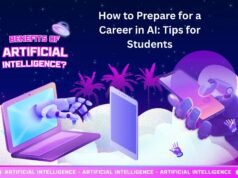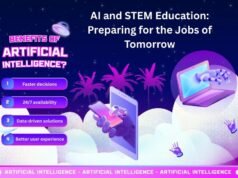Introduction
Artificial Intelligence (AI) is revolutionizing industries, shaping the job market, and redefining career opportunities. As AI technologies continue to advance, their impact on employment is becoming a widely debated topic. In this study module, we will explore the future of AI jobs, expected transformations in various industries, the skills required for AI-driven careers, and the challenges and opportunities associated with AI employment.
1. The Growth of AI in the Job Market
1.1 The Rise of AI-Powered Automation
- Automation and AI-driven software are expected to replace repetitive and routine tasks.
- Increased efficiency in manufacturing, customer service, healthcare, and finance.
- AI is enhancing productivity rather than eliminating jobs entirely.
1.2 Demand for AI Specialists
- Growing need for AI engineers, data scientists, and machine learning experts.
- AI ethics specialists and AI security analysts will be in high demand.
- Hybrid roles integrating AI skills with business, healthcare, and finance.
1.3 AI in Startups and Large Enterprises
- Startups leveraging AI for innovative solutions.
- Large enterprises investing heavily in AI research and development.
- AI entrepreneurship opportunities expanding globally.
2. Industries Most Affected by AI
2.1 Healthcare and Medicine
- AI-powered diagnostics and robotic surgery.
- AI-enhanced drug discovery and personalized medicine.
- Telemedicine and AI chatbots in healthcare support.
2.2 Finance and Banking
- AI-driven fraud detection and risk management.
- Automated financial advisors (robo-advisors) and algorithmic trading.
- Enhanced customer service through AI-powered chatbots.
2.3 Manufacturing and Logistics
- Smart factories with AI-driven robotics.
- AI in supply chain optimization and predictive maintenance.
- Autonomous vehicles in logistics and delivery services.
2.4 Education and Learning
- AI-powered personalized learning experiences.
- Automated grading and AI tutors.
- Virtual and augmented reality in education.
2.5 Retail and E-Commerce
- AI-driven recommendation engines and personalized marketing.
- Automated inventory management and smart supply chains.
- AI-powered virtual shopping assistants and chatbots.
2.6 Cybersecurity and IT
- AI-powered threat detection and cybersecurity analytics.
- AI-driven automated security response systems.
- AI in ethical hacking and penetration testing.
3. New AI Job Roles Emerging
3.1 AI Engineering and Development
- AI/ML Engineers
- Data Scientists
- AI Researchers
3.2 AI Ethics and Policy
- AI Ethics Consultants
- AI Compliance Officers
- AI Bias Analysts
3.3 AI in Business and Management
- AI Strategy Managers
- AI Product Managers
- AI Consultants
3.4 AI in Creative Industries
- AI-Powered Content Creators
- AI Game Designers
- AI-Assisted Filmmakers
3.5 AI in Legal and Compliance
- AI-Powered Legal Analysts
- AI Compliance and Policy Advisors
4. Skills Required for AI Careers
4.1 Technical Skills
- Machine Learning and Deep Learning
- Data Science and Analytics
- Programming Languages (Python, R, Java, etc.)
- AI Ethics and Bias Mitigation
- Cloud Computing and Big Data
4.2 Soft Skills
- Critical Thinking and Problem-Solving
- Adaptability and Lifelong Learning
- Collaboration and Communication Skills
- Ethical Considerations and Decision Making
4.3 Certifications and Learning Resources
- AI & ML Certifications (Google, IBM, Microsoft, Coursera, Udacity, etc.)
- Online AI Bootcamps and AI Specializations
- University AI Programs and Research Fellowships
5. Challenges and Ethical Considerations
5.1 Job Displacement and Workforce Transition
- How AI automation may lead to job losses in certain sectors.
- Need for reskilling and upskilling programs.
- Government and corporate initiatives for AI workforce transition.
5.2 AI Bias and Fairness
- Risks of biased AI decision-making.
- Importance of ethical AI development.
- Transparency in AI algorithms and explainable AI.
5.3 AI and Privacy Concerns
- Data privacy laws and AI compliance.
- Risks of AI surveillance and personal data misuse.
- AI in cybersecurity and digital rights protection.
5.4 The Role of Governments and Organizations
- AI policies and global regulations.
- Public and private sector collaboration for AI governance.
- Ethical AI development frameworks.
6. Future Predictions for AI Jobs
6.1 AI as a Collaborative Tool
- AI will complement human workers rather than fully replace them.
- Rise of augmented intelligence enhancing productivity.
- Increased hybrid job roles requiring both AI and human expertise.
6.2 AI’s Influence on Work Culture
- More remote and AI-assisted jobs.
- Increased gig economy opportunities in AI development.
- AI as a career catalyst in emerging economies.
6.3 Global AI Job Market Trends
- Growth of AI talent hubs in North America, Europe, and Asia.
- AI-driven economic transformation in developing nations.
- Increasing investment in AI R&D and AI-driven startups.
Conclusion
The next decade will witness significant transformations in AI-related jobs, creating both challenges and opportunities. AI will continue to drive automation, create new career paths, and reshape industries. The key to thriving in this AI-powered future lies in continuous learning, upskilling, and embracing technological advancements ethically and responsibly.
Further Reading and Useful Resources
- Artificial Intelligence at Work – https://www.weforum.org/
- AI & Future Jobs Report – https://www.mckinsey.com/
- AI in the Workplace – https://hbr.org/
- World Economic Forum’s AI Predictions – https://www.weforum.org/
- AI & Future Careers – https://builtin.com/artificial-intelligence
This study module provides a comprehensive understanding of the future of AI jobs, helping students prepare for upcoming opportunities and challenges in the AI-driven job market.















Thank you for your sharing. I am worried that I lack creative ideas. It is your article that makes me full of hope. Thank you. But, I have a question, can you help me?
Thank you for your sharing. I am worried that I lack creative ideas. It is your article that makes me full of hope. Thank you. But, I have a question, can you help me?